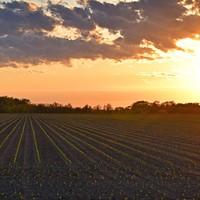Labor Shortages In Rural America Impact Agriculture Industry
Image Source: Lindsey Pound / The Packer
Growing labor shortages may slow US agricultural output and curtail growth in the US economy. “Barring an unforeseen change in labor force participation rates or immigration policies, the pool of available workers is set to shrink sharply in the next few years,” says Rob Fox, director of CoBank’s Knowledge Exchange. CoBank, the primary credit bank of the US Farm Credit System, released a quarterly report highlighting the struggles. “There is no single reason people are stepping away,” Fox explains. “It’s a combination of rising caregiving responsibilities, job skill mismatches, mental health challenges and higher disability rates. These are complex issues that won’t be resolved overnight.”

More Agriculture News
ICE Raids Pose Harvesting Issues For California Farms
USDA Staff Firings Put A Hold On Agricultural Conservation Work
Farmers In Illinois Are Expanding Produce Supply Chains
Indian Farmer Grows Apples In Impossible Climate, Hopes Demand And Production Will Grow
University Of Michigan Researchers Arrested After Smuggling Crop Fungus From China
Politics Further Uncertainties For Farmers
Farmers Face New Battles As Bird Flu Jumps From Poultry To Cattle
Image Source: Jeffery DelViscio / Scientific American
While the bird flu has been a known infectious disease among poultry farmers for years, the jump from poultry to dairy was far more unexpected. Poultry farmers have been lining the surrounding areas of their chicken barns with gravel and even shining lasers to deter other birds from contaminating facilities. Now, cattle farmers may be following suit in the same practices as bird flu makes the jump from chickens to cows. Farmers in Texas noticed cattle were producing less dairy and getting sick back in 2024, and sent blood samples to Elisha Frye of Cornell University's College of Veterinary Medicine to be studied. Frye concluded it was H5N1, a strain of bird flu. Humans are getting sick from H5N1, too, although not as often. The Centers for Disease Control and Prevention reported 70 bird flu infections in humans since last year, where most cases included farmworkers in contact with sick cattle and poultry.

Vertical Robotic Farms Supply Whole Foods Market With Sustainable Fresh Produce
Image Source / Progressive Grocer
Meet Opollo Farm, an automated vertical farm using cubic storage and robotics to grow high quality produce. The innovative farming system was built by AutoStore and OnePointOne, and has now become a supplier of Whole Foods Market, at least in Arizona where the farm is based. The farm operates entirely indoors, using robots to water and maintain plants as well as software that adjusts programs based on data highlighting real time plant conditions. “Traditional farming consumes vast amounts of water and land — resources that are becoming scarce,” added Sam Bertram, CEO of OnePointOne. “With AutoStore’s modular robotics and our plant-production technology, we can grow food almost anywhere, using a fraction of those resources. This collaboration helps overcome the cost and scalability challenges of vertical farming, finally making locally grown produce — the No. 1 priority for U.S. consumers — possible even in urban areas.”

Farmers And Scientists Hopeful For The Future Of Sea Asparagus
Image Source: Adam Dixon
Salicornia, a.ka. seabeans, pickleweed or sea asparagus, is a salt-tolerant plant that grows well in intense environments. Scientists believe the plant can be used to aid soil salinity levels, a growing concern among environmentalists and farmers. Farmers produce fertilizer waste that damages their own soil while simultaneously breaching waterways. Salicornia's unique, salt-absorbing properties may allow it to absorb this waste, according to research professor Megan Davis of the Harbor Branch Oceanographic Institute at Florida Atlantic University (FAU). “The plants will pick up the salt out of the soil, and they can also be used to help pick up nutrients along the shoreline to help improve the coastal waters,” she says. Planting the crop would prove beneficial to the environment, plus sea asparagus is delicious. In its first year of being bought out by the German company Bördegarten, a salicornia start-up called Salifaktur harvested 880 pounds of the crop a week, supplying hotels, grocery stores, and restaurants. Davis remains hopeful for increased demand for the crop in the U.S.A: “It’s just a matter of time and good marketing.”

USDA Unveils $31 Billion In Relief Aid For American Farmers
Image Source: Tom Fisk
This month, the USDA made $10 billion from December's spending bill for the Emergency Commodity Assistance Program available to American farmers. Those who produce row crops like soybeans, corn, or rice are eligible for aid, as the industry experienced high costs, low profits, and faltering prices over the past year. The one-time payment is designed to mitigate these losses dating from the beginning of 2024. Qualifying farmers can apply online until April 15th. Later this year, farmers can expect another $21 billion in relief aid for losses stemming from natural disasters like hurricane Helene.
